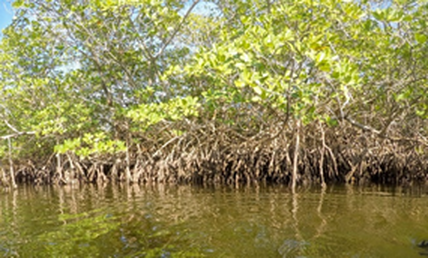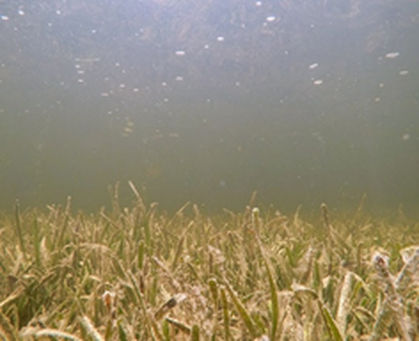Read below to learn more about mangrove and seagrass ecosystems
|
Mangrove ecosystems, like many other coastal habitats, have high ecological and economic significance. They provide essential ecosystem services to humans, acting as natural barriers that protect the coastline from erosion and storms. Mangrove habitats are well known for their high biological productivity. Mangroves provide individuals a balance between foraging opportunities and predation risk, making them ideal nurseries for many species, including commercially important fish. Mangrove habitats can sustain more than seventy different direct human activities, ranging from wood production to fisheries to tourism.
Florida’s coastlines are also shielded from storm damage by millions of acres of seagrass meadows. Seagrasses share similar importance with mangroves in terms of ecosystem services and the economic value that they provide to human communities. Seagrasses are among the most productive ecosystems on the planet, serving as an important carbon sink. Another high-value ecosystem service of seagrass meadows is commercial fishery support. Seagrass meadows are critical habitats for many species of fish, birds and invertebrates, including juveniles of commercially important species. The structurally complex habitat of the many blades of seagrass, similar to that of the mangrove roots, allows juveniles protection from predation and abundant food sources, leading to increased growth rates. |
What can you do to help!
· Educate yourself and others on local environmental issues
· Eliminate littering and participate in coastal clean-up days
· Participate in responsible, non-destructive tourism
· Advocate to protect and conserve these ecosystems to local governments
· Donate money to organizations that research and conserve mangroves and seagrasses
· Volunteer with local environmental organizations
· Educate yourself and others on local environmental issues
· Eliminate littering and participate in coastal clean-up days
· Participate in responsible, non-destructive tourism
· Advocate to protect and conserve these ecosystems to local governments
· Donate money to organizations that research and conserve mangroves and seagrasses
· Volunteer with local environmental organizations
|
Partner with us! We are always looking for new schools, scientists, and non-profit organizations to partner with. Please contact us here to start a conversation.
Hear from us! Sign up for our newsletter to hear about what is happening at Field School as well as upcoming offers and specials. |


